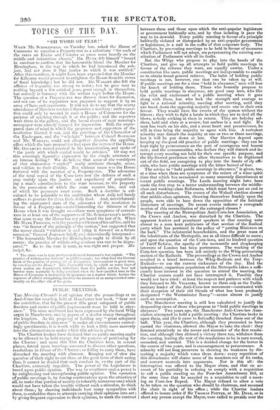TOPICS OF THE DAY.
"OH WORD OF FEAR!"
WHEN Mr. SCHOLEFIELD, on Tuesday last, asked the House of Commons to sanction a Property-tax as a substitute "for such of the taxes on Excise and Customs as press most heavily on the middle and industrious classes," Ma. Iltatz felt himself "bound in candour to confess, that his honourable friend the Member for Birmingham, in the way in which he had introduced the sub- ject, had not done it that justice to which it was entitled." After this exordium, it might have been expected that the Member for Kilkenny would proceed to enlighten the House from his stores of fiscal knowledge ; but he did not. Mr. WAKLEY also felt the afflatus of loquacity too strong to resist ; but he gave vent to nothing beyond a few satirical jests, good enough in themselves, but scarcely in harmony with the serious topic before the House. The question of a Property-tax was thrown down for discussion, and not one of its supporters was prepared to support it by an array of facts and arguments. It will not do to say that the scanty attendance of Members rendered discussion a mockery: such a ques- tion could only be mooted in such a House of Commons for the purpose of speaking through it at the public; and the reporters were there in the gallery, and the broad sheets of next morning's newspaper were already damped for impression. Still, the unpre- pared state of mind in which the proposers and supporters of the resolution blurted it out, and the persiflage of the Chancellor of the Exchequer, and the " wit-fight " between Colonel SIDTHORP and Mr. WAKLET, could not altogether disguise the appalling effect which the bare proposition had upon the nerves of the House. Mr. GOULBURN waxed poetical in his consternation, and spoke of "the panic with which capital would be stricken." Or may not this seemingly figurative expression be the simple utterance of an intense feeling ? We do believe that some of the worshipers of that abstraction " capital" really attribute thought, sense, and volition to their divinity. Not without cause was the House fluttered with the mention of a Property-tax. The advocates of the total repeal of the Corn-laws rest the defence of such a step mainly , upon the justice and expediency of proportion- ing a man s contributions to the state revenue, to the property in the possession of which the state secures him, and out of which his payments must come. Such a doctrine is cal- culated to be palatable to the multitudes whose daily toil barely suffices to procure for them their daily food. And, notwithstand- ing the unprepared state of the advocates of the resolution in favour of a Property-tax—notwithstanding the thinness of the House when it was brought on—there were symptoms of earnest- ness in at least one of the supporters of Mr. SCHOLEFIELD'S motion, that seem to say the House has not yet heard the last of it. When Mr. MARK PHILLIPS, as is the practice with Men of his calibre, said he was "in favour of the principle of the motion," but suggested that the mover should "withdraw it and bring it forward on a future occasion," General JouNsoN briefly and determinedly interposed- " The honourable Member for Birmingham ought to divide by all means : the practice of withdrawing motions was one to be depre- cated." So to the vote it went, as was right and proper. Hic
&c.
* The above was in type previous to General JOHNSON'S last exploit. "The practice of withdrawing motions" is pitiful enough; but what does the General think of the practice of getting rid of discussions, inconvenient to great men, by countbq out the Home? This disgraceful trick, by which so many days of every session are fraudulently withdrawn from the public service, does not become more reputable by being practised when the best-qualified man in the Rouse of Commons is instructing its ignorance on a matter which, besides the exposure of official wrongdoing, involves the interests of an unrepresented com- munity on the other side of the globe.


























 Previous page
Previous page